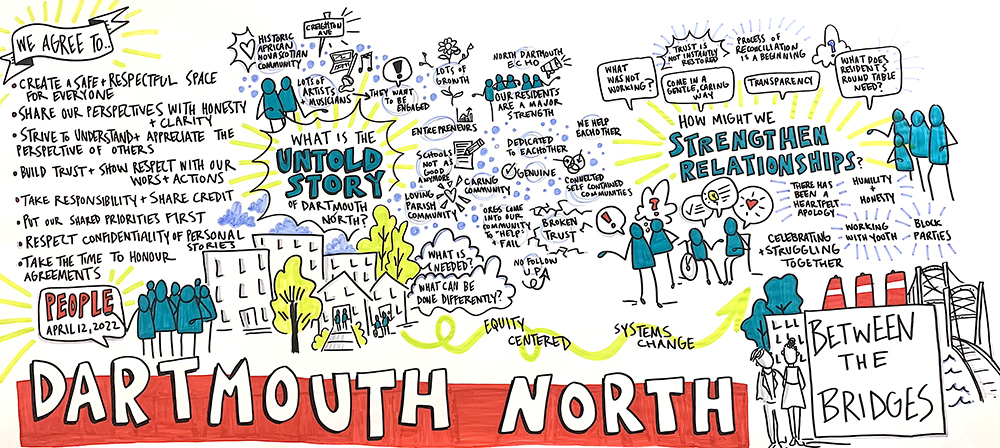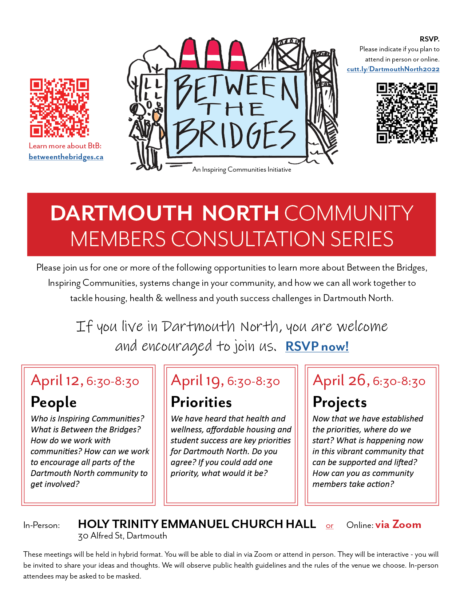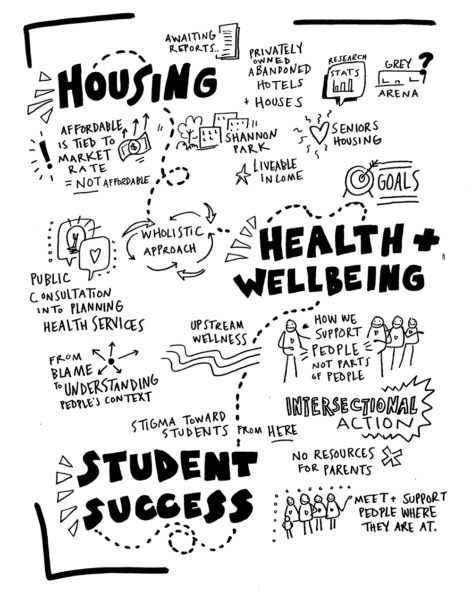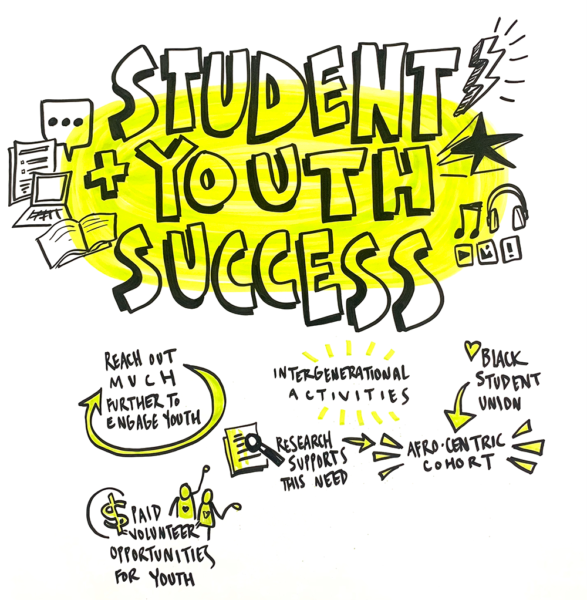Between the Bridges Renews Its Community Mandate

Between the Bridges, started in 2016, predated Inspiring Communities but formally became an initiative of the organization in 2019. The initiative served the community of Dartmouth North, providing collaborative leadership to social change through its collective impact approach. After six years, in early 2022 the work at Between the Bridges shifted in part due to the re-envisioning of Inspiring Communities. In April, Inspiring Communities hosted a series of three public consultations, and in June followed up with a youth engagement, to establish how the work at Between the Bridges could continue in alignment with Inspiring Communities’ new strategic directions. What follows is a harvest of what we heard.
Community Consultations: People, Priorities, Projects
On three consecutive Tuesday evenings, public consultations were held in hybrid format, with participants invited to take part via Zoom or in person at the Holy Trinity Emmanuel Church. Inspiring Communities’ Executive Director Louise Adongo, interim BtB coordinator Shelley Fashan and Communications Manager/ BtB Core Support Charlene Boyce attended to listen and respond to inquiries. Our hosting team was:
- Basia Solarz of Braver Path, facilitator
- Rach Derrah, graphic facilitator
- Elissama Menezes, online facilitator
Over the three sessions our attendance was about 52 people in total, and some people only attended a portion of one session. Twelve of those attended in person. Attendees included members of the Residents’ Roundtable who had strong relationships with Between the Bridges; elected officials and government representatives; curious community members who had not been involved before; and a few youth.
We opened each evening with a land acknowledgement and a spoken word poem, featuring local artists Guyleigh Johnson, Kayley Dixon, and Kali Williams.
The sessions were intended to build on each other, so the first opened with a presentation on the history and relationship between Inspiring Communities and Between the Bridges. We then invited discussion around these themes at the consecutive evenings:
- Who is Dartmouth North and what is the community’s untold story?
- Are Health and Wellness, Student and Youth Success and Housing the right priorities for us?
- What actions should BtB focus on right now, and what kind of person does the community need when we hire?
Over the three sessions, a few consistent messages emerged: community needs are many and deep; the residents who had been involved with BtB in the past, particularly the Residents’ Roundtable, felt trust with Inspiring Communities was broken; residents felt there was a stigma attached to North Dartmouth, in areas from housing to health to education, and described personal and economic discrimination experienced.
What we heard: April 12 – People
Dartmouth North residents want to be engaged, and are a major strength of the community. However, residents have a hard time trusting, because many organizations have come to the community to help and failed. There is a history of broken trust for many, including now with Inspiring Communities.
Dartmouth North has a strong sense of community, AND it is a community composed of many well-connected, self-contained communities. Some residents in the community would enjoy knowing more about its history, like Crichton Avenue’s history as an African Nova Scotian community.
Learn more: Halifax Examiner talks about Adrienne Lucas’s thesis, the thesis itself — Up the Avenue, a post on the Dartmouth History Blog, and another post on the City of Dartmouth Blog.
Dartmouth North is popularly depicted as a ‘transient’ neighborhood, but there are many long-term residents. The community has cultural strengths including the North Dartmouth Echo, a community news outlet that focuses on the positive, and many artists and musicians. Businesses are also supportive of the community.
We help each other: Dartmouth North is the kind of community where you can post on Facebook in the morning that you need a Covid test, and a rapid test slides into your mailbox that afternoon.
A follow up question asked how Between the Bridges can continue to work with the community, considering the sense of broken trust some had expressed. Residents asked for more “transparency, humility and honesty, and that the Residents Roundtable be engaged in a spirit of reconciliation. They asked what was not working that things had to change? Another group approached the question from a more expansive point of view, suggesting block parties and working with youth.
In one breakout group, Executive Director Louise Adongo offered a heartfelt apology for the hurt the residents had experienced as a result of Inspiring Communities’ necessary restructure. The group was moved by this.

What we heard: April 19 – Priorities
Between the Bridges had been doing work in eight areas, and in the hand over during transition, three of these were identified as key going-forward priorities. We opened a discussion to validate that and to consider what
Review of What Has Happened
We asked residents and community organizations to review for everyone what actions on the priorities had happened in the past.
Alison O’Handley from the Dartmouth Learning Network shared these highlights of the work on Youth and Student Success:
- The community identified issues such as students passing without achieving grade outcomes, class size, bullying, and diversity in school staffing
- Some of the work done was around rebuilding broken trust. Families were advocating for change at schools: what was perceived as a behaviour problem, was in fact a literacy problem.
- Relationships were built (and must continue to be built) so that the education system and community could better connect and communicate moving forward.
- The Student Success team had identified TRANSITIONS (school to school, grade to grade, graduation) as a leverage point to work on.
Several contributors spoke to the history with housing including residents, government representative Jodene Dunleavy, and MLA Sue LeBlanc. Much of the discussion focused on the need and established bases for future action.
BtB hosted a Housing Lab with these concrete results:
- The Public Good Society instigated an Affordable Housing navigator / team project
- HRM introduced the Tiny Homes bylaw change.
If we want to focus on truly affordable and accessibly housing (with rent geared to income housing) – no small group of people will get far with this. There needs to be some focussed organization in Dartmouth North taking on this idea and making it their focus “Affordable Housing Dartmouth North” and apply for grants for rapidly built housing.
- Housing was an issue before COVID.
- There has been an issue of renovictions. Housing accessibility, affordability and standards have been longstanding issues in this community.
- Unused housing stock exists (hotels and various places where there are possibilities and opportunities.)
- Need more priority on tiny homes and some ways to increase housing stock but we have to get creative and think in a different way than we have been all along.
- Zoning and land ownership barriers exists. Our bylaws are restrictive.
A resident spoke to the history with the Health and Wellness priority, which again was establishing a basis of assumptions for future action:
- Mental health is stigmatized
- Mental and physical health accessibility is a particular concern for particular groups: youth, Indigenous, Black and newcomer populations, and 2SLGBTQIA.
- There is one health clinic in the neighborhood that is oversubscribed already.
- Moving Mental Health and Addictions services from downtown Portland Street to Portland Hills has adversely affected people in Dartmouth North.

Looking Forward
In small groups, people discussed “What is important about this priority” and “Future considerations as we develop action plans”. The discussions provoked engaged conversation.
View the Jamboard results in a PDF here.
Around the theme of YOUTH, Intersectional Action was identified as a theme. The pandemic seriously disrupted the work going on. There was a strong focus on the role of parents, what resources were available to parents, and how disconnected they felt in the education system. The Take Action group, the North Grove and the Boys and Girls Club were identified as potential collaborators and advocates. Discrimination experienced by students coming from Dartmouth North and in particular John Martin Junior High was discussed.
With regard to HOUSING, three considerations that emerged strongly were Affordable for Who?, Equity and Seniors. These law/ policy considerations were named:
- Simplify bureaucratic processes around affordable housing, but remain mindful of housing standards
- Advocating for livable income is an essential part of this work
- Policy suggestion: housing/buildings cannot remain abandoned or empty for more than 3 years
- Stick with CMHC definition of affordable or redefine to make it more accessible to more people
- Affordable and accessible/appropriate housing for seniors is needed
Suggestions for potential locations included Shannon Park, Gray’s arena, abandoned/empty hotels, and Port Wallace. These suggestions for actions emerged:
- catalogue the unused or underused properties in Dartmouth North which could support tiny suites or other affordable housing options
- promote the tiny homes / suites bylaw change and opportunity
- explore commercial properties for opportunities
The group added the consideration that the Public Good Society is offering training to non-profits who want to create affordable housing.
Regarding HEALTH AND WELLNESS, the residents talked about needing investment in and access to a broad holistic range of services: upstream supports like parks, active transportation and recreation, and immediate needs like mental health, vision, dental and general health services. The community wants a centrally-located multi-disciplinary publicly funded health service soon. The need for culturally appropriate, culturally informed service was also identified.
This session also produced a set of notes that did not relate to the priorities.
How can we get back to our humanity? We need to learn how to navigate disappointments without accusations or blame. How can we begin to default to healing and wholeness…?
The pandemic, economy have set us back about 15 years. Shootings since Christmas all over the city…
Where does the safety piece come in — food insecurity, lack of safe injection site & the stigma opposing that…
In agriculture there is something called “hard pack” where the earth cannot absorb things. You need to break through that to absorb things. How do we break through the hard pack here?

What we heard: April 26 – Priorities
Participants brainstormed for three things:
- What are the projects you would like to focus on right now for this priority?
- What qualities, skills or experiences should future BtB staff have to carry out this work?
- How can you, as community members, support this? How should we stay connected?
In terms of Health and Wellbeing, the participants noted that Dartmouth North lacks facilities and investments for adults and youth struggling with mental health as well as physical. The community also needs support systems for minorities and women facing violence, including translation. They would like to advocate for increased investment in all these areas.
There is work in progress to attract better healthcare facilities, and an outreach centre in the community.
Churches and faith communities were identified as one channel that can educate parishioners around mental health.
A current project related to Student & Youth Success is Prince Andrew’s Black Student Council, which is trying to establish an Africentric Learning Cohort. At the session, MLA Sue LeBlanc offered to connect the students with her colleagues for support. An attendee noted that North Grove has a new volunteer opportunities for youth program that offers stipends.
Staffing Discussion
Attendees identified these desirable qualities in future BtB staff:
- Diverse representation / person of colour
- Educated
- Skilled facilitator
- Connections to government, health and wellbeing, education
- Born, raised in Dartmouth North
- Understands the school system, youth dynamic, transportation system
Having collected this community input into the job postings, Inspiring Communities received a question around the process to be followed in hiring near the end of the evening. This led to a discussion about the historical and future role of the Residents’ Roundtable (RR) in the process of recruiting and hiring staff.
An attendee who works in Human Resources expressed concern about a small group of residents having a decision-making role in hiring for a community position, and noted that there are groups of residents not represented among the RR.
One of the youth present asked for a description of the RR. While the RR has had diverse representation among its membership over the years, the pandemic and other factors, including timing of meetings and feelings of belonging/not belonging, have reduced the diversity of representation as well as the number of RR members.
Read the report on the Dartmouth North Youth Engagement here.
Share this:
Comments are closed